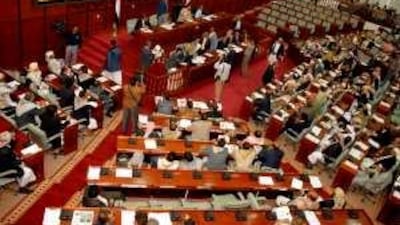SANA'A // Many Yemenis do not know much about their parliament and have little faith in the institution, according to a survey released by a non-governmental polling centre in Sana'a yesterday. Only 23.4 per cent of Yemenis knew that there are 301 MPs in the parliament, while 71.2 per cent said they simply do not know, and 5.4 per cent provided the wrong figure, the survey, conducted by the Sana'a-based Yemeni Polling Centre, found
The centre polled 1,000 people - 502 men and 498 women - aged 18 and above from 12 provinces. The poll found that only 61.4 per cent of the male respondents and 26.3 per cent of the females knew the name of the current speaker of parliament. More than 53 per cent of the respondents, mostly women, said they did not know what the parliament's tenure is. Twenty-four per cent of the respondents, mostly men, said it is four years, while only 13.8 per cent, again mostly men, said it is six years, which is the correct answer.
Yemen adopted the multiparty system following the unification between north and south in 1990. The first parliamentary election was conducted on April 27, 1993, and elections were held in 1997 and 2003. The fourth parliamentary poll was supposed to be run in 2009. The ruling party and the opposition agreed in February 2009 to postpone the election for two years to carry out election and political reforms.
The study, part of the polling centre's Yemen Parliament Watch project, which is mostly funded by the European Union, also found that there is minimal interaction between MPs and their constituents - only 21.4 per cent of respondents said they had been able to contact their local MP. That may be one of the reasons the study found that nearly half of respondents said they had "no confidence" in the parliament which is mostly dominated by influential tribal chiefs, military and businessmen.
In keeping with that finding, only 19.8 per cent of the respondents said they were content with the performance of their local MP, while 59.7 per cent of the respondents said their MP did not do anything during his or her current term in the parliament. Only 15.1 per cent of respondents said their MP did fulfil the promises they made in their electoral campaign. In addition to other studies on parliament, Yemen Parliament Watch has set up a website providing MPs, civil society activists, journalists and the public with parliamentary news and with a means of informing themselves about the workings of parliament and its members, according to Hafiz al Bukari, the president of Yemen Polling Centre.
"This programme aims at supporting parliament and documenting its activities, but it will be an eye of the public on the parliament," said Mr Bukari. Shawki al Kadhi, an MP representing the opposition Islamist Islah party, said: "These results are not a surprise and are expected. The weakness of the parliament is because it is dominated by one bloc and that has weakened its monitoring role of the government. This weakness has frustrated people and thus the contact between the MPs and their people is missing."
Although 64.3 per cent of the respondents believe that the parliament is important, against 15.8 per cent who believe it is not, 26.2 per cent of respondents believe that providing services and implementing projects is the main function of parliament. Twenty one per cent of respondents said that they did not know what the function of the parliament is. Only 27.9 per cent of the men surveyed and 13 per cent of the women said the function of the parliament is to vote on laws and legislation, which is one of the actual functions of Parliament
"Despite the high awareness level among the general public of the importance of the parliament among respondents, tying the importance of parliament with roles and functions that are not actually the main functions of the parliament creates confusion in the relationship between parliament and society," the report said. "When citizens do not differentiate between the functions of parliament and the functions of the executive authority, they therefore assess the performance of parliament based on the extent of the efficiency or inefficiency of the executive authority."
Concerning the issues parliament discusses, the study found that more than half of the respondents did not know what the most important issue discussed by parliament is. @Email:malqadhi@thenational.ae

